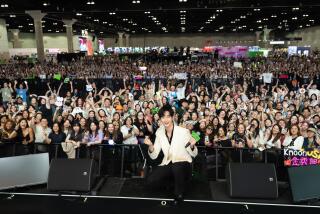South Korea TV show opens a window on the North
SEOUL — Lee Seo-youn rehearses a dance routine she’ll perform in a couple of hours in a TV studio. Slender, graceful and dressed in a form-fitting hot pink maxi-skirt, Lee looks like a South Korean celebrity.
Appearances can be deceiving.
As a regular panelist on South Korean television’s “Eje Mannareo Gapnida,” which airs on cable’s Channel A, Lee is one of a dozen or so female North Korean defectors featured on the program.
Part talk show and part talent show, the title translates as “Now On My Way to Meet You,” a name that conveys the program’s goal of raising awareness between average North and South Koreans.
It has been well received by the South Korean public for its unique approach to the prickly North Korea issue since it debuted in December, with mostly positive reviews and a growing viewership.
Although Pyongyang, North Korea’s capital, and Seoul, the South’s, are only 120 miles apart, the North remains an unknown land to many here. Media in the South generally adopt a solemn tone when covering North Korean defectors’ stories, but this program handles the sensitive topic using humor and a light touch. The defectors act as a window allowing South Koreans a peek at the closed society next door.
With help from three moderators, about a dozen North Korean women compare and contrast the two Koreas’ language, culture and customs with a panel of four male South Korean TV personalities.
When the South Koreans hear that “plastic surgery is quite common in North Korea,” their eyes widen in surprise. And it turns out that playing the lottery in the North is popular, just like in the South.
So far the defectors have all been women, though the producers promise to include men soon. Not surprisingly, there’s a clear preference for the extroverted and attractive. Some regulars rotate, leaving room for a new defector with different talent and stories each week.
With her good looks and charming personality, Lee, 26, has become one of the show’s most popular panelists.
“I heard about the program through a friend. I was hesitant at first because I’m a shy person, and I still have family members back in North Korea,” Lee said. “But now I’m glad I decided to come on the show. I get to share my story and inform many people about North Korea.”
As a minority group, the more than 25,000 defectors in South Korea are relatively invisible in society, until they face discrimination and even contempt when their backgrounds become known.
“I believe that some people direct the hostility toward the North Korean leadership at ordinary North Korean people,” said Kim Eun-sun, a 26-year-old defector who recently published an autobiography in France. “Though it hurts, I understand.”
“Now On My Way” producer Lee Jin-min said she hopes the program helps connect South Koreans with the defectors.
“The defectors say that they feel anonymous, like a seed of grain dropped from the sky in a foreign place when they first arrive in South Korea,” she said. “Hearing the stories from such people makes it more personal and can call attention to the fact that war and separation is an ongoing issue.”
Each of the women entertain the audience with their talents, including singing and dancing, which some did in front of Kim Jong Il, North Korea’s recently deceased leader. Others perform comedy skits, including one who impersonates a famous North Korean anchorwoman. They banter with the male South Korean panelists, appearing funny, confident and fearless.
But each also harbors a bitter story. Almost all have left family members in the North: parents, children, a spouse. A few were swindled by human traffickers and sold as slaves or wives in China. Some were caught by Chinese police or North Korean soldiers and were forced to repatriate.
Near the end of the show, after the laughter and performances, the women share their difficult stories.
“In the wintertime, it made me sad when I stepped into a warm apartment,” Lee Seo-youn said in one episode. “Thinking of my parents and sister who will be suffering in the cold, I couldn’t bring myself to stay warm. So I turned the heat off and stayed in the cold room, thinking of and missing my family.”
“I’ve been healed here, but my family, my friends and our nation are all still suffering,” another panelist said. “The wound from separation continues to this day.”
Choi is a special correspondent.
More to Read
Sign up for Essential California
The most important California stories and recommendations in your inbox every morning.
You may occasionally receive promotional content from the Los Angeles Times.










